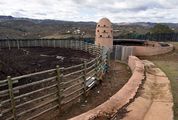THE past two weeks have seen an extraordinary flux in political affairs, both global and domestic, all potential game-changers in their spheres.
We have seen US President Barack Obama pull off his nuclear agreement with Iran against all the odds, to add to his detente with Cuba a few months ago. Together, they constitute a landmark shift in international relations.
Across the Atlantic, we have seen the 19 eurozone countries, led by a tough Germany, avoid forcing Greece out of the common currency without making too many new concessions, despite a challenge from that country’s new left-wing government, backed up by a strong "no" vote in its referendum. This has left Greece in an economic limbo — and is a stark warning to we South Africans.
Meanwhile, here at home we have seen another rash of top-level dismissals for incompetence and corruption (how on earth can a state corporation order trains that don’t fit the country’s railway network?).
At the same time, the government has moved closer to a foolhardy nuclear power deal with Russia that could break the bank and create a feeding trough for our Gadarene swine bigger than any we have seen before.
Then, for good measure, the civil war in the Congress of South African Trade Unions (Cosatu) has finally ended with a split that will weaken the ruling alliance and lead to the emergence of a rival labour federation and the imminent prospect of a new political Labour Party.
Obama’s nuclear deal with Iran is by far the most important of all these.
Together with his resumption of relations with Cuba, he has brought the curtain down on a self-image of "US exceptionalism" that caused the US to feel not only entitled, but obliged, to be the policeman of the world whose role was to mould all errant nations into a universalised image of its democratic self.
Obama hasn’t required Iran or Cuba to change internally. All he wants is to stop Iran from getting a nuclear bomb, and to end the absurdity of regarding the political system of a small offshore island as an existential threat to a superpower.
In doing this, Obama has signalled that the US can live in peace with people who have different value systems from its own. He no doubt hopes they will change, but he is not going to try to bomb them into acceptance as George Bush did.
Obama still has a way to go in withstanding attempts by the warmongers in Congress to scuttle his Iran deal. But I think he will succeed. And I have a hope that he is right in believing that by opening Iran to the world, we shall see that country — for long an important trading partner of ours — begin to change internally.
I sense that the Iranian revolution has run its course, as all revolutions eventually do when their people, especially their young people, grow sick and tired of the worn-out slogans and suffocating controls and restrictions that have lost all relevance to their lives.
Let Blade Nzimande take note of that. He is yesterday’s man whose revolution fizzled out years ago. As Trevor Manuel pointed out in a trenchant article in City Press recently, the South African Communist Party is no longer even a party; it is a sort of lobby group within the African National Congress (ANC) with no real basis of political legitimacy in its own right.
Which brings me to the imminent birth of a Labour Party out of the bifurcation of Cosatu. What remains of Cosatu under the leadership of President Jacob Zuma’s surrogate, Sdumo Dlamini, will become what Zwelinzima Vavi always warned against — a labour desk in Luthuli House, a collection of public sector unions toeing the government line. Irvin Jim’s National Union of Metalworkers of SA and the eight private sector unions allied to it will form their own separate federation and do what trade unions are supposed to do, but from a narrower base.
But it is the prospect of a Labour Party that could be our game-changer. If it is to succeed, it will need to hammer out a new labour policy more appropriate to the needs of our sophisticated industrial economy than the crudely adversarial one we have now choking productivity and destroying jobs. What the new SA needs is greater profit sharing, more worker participation in the running of companies and more modest CEO rewards to narrow the wealth gap.
A new, modern-minded Labour Party that can do that and help this country get its economy growing again will become a political player to be reckoned with.
I could see such a party capturing a large chunk of support from black voters who are drifting towards the Economic Freedom Fighters (EFF) because they are disillusioned with the corruption and inefficiency of the ANC. The EFF is not their natural home, for Julius Malema and his rabble-rousers have no constructive policies to offer. It is the party of protest, whose only strategy is to disrupt and cause chaos — and chaos is not in the interests of people who want to make something of their lives.
Which brings me to the blank cheque we are being asked to sign for the acquisition and installation of those eight (or is it nine?) nuclear power stations that Zuma appears to want Russia to build for us. Not only are these plants horrendously expensive, but the latest World Nuclear Industry Status Report disclosed only last week that their construction is delayed in 75% of cases, some for up to 30 years, leading to huge cost overruns. Medupi in spades.
Therein lies the stark lesson of Greece. Greece is in trouble because for years it spent more than it earned. When it had its own currency, it could devalue to keep going. When it entered the eurozone, it could no longer do that and had to seek bail-outs from its euro partners.
But the euro partners are not prepared to continue bankrolling Greece indefinitely. German taxpayers object to subsidising neighbours they believe don’t work as hard as they do. They are demanding that Greece apply tough austerity measures, but austerity is not only unpopular among the Greek voters, it is also not the way to stimulate economic growth. That is the Catch-22 in which Greece had landed.
It has now reached a point where the latest bail-outs are used almost entirely to pay interest on the previous ones. There is no new money to get the economy going.
How this is going to end, I don’t know. But one thing I do know is the stark lesson it holds for SA. Don’t go there!
Our coffers are nearly empty as it is, thanks to the Zuma administration’s wastefulness, incompetence, corruption and economic ignorance. And the rating agencies are looming over us, waiting to give this country junk status ratings.
This fills me with foreboding as I think of those nuclear power stations and putting ourselves in hock to Russia.
• Sparks is a former editor of the Rand Daily Mail






















Post a comment